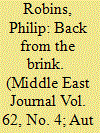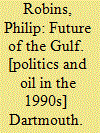|
|
|
Sort Order |
|
|
|
Items / Page
|
|
|
|
|
|
|
| Srl | Item |
| 1 |
ID:
092626


|
|
|
|
|
| Publication |
2008.
|
| Summary/Abstract |
This article focuses on the issue of narcotics and Turkey over a 30-year period. Its point of departure is the 1970s, when the opium production crisis in Turkey, and its associated corrosion of relations with the US, had been brought to an end. The article concentrates on the period in the late 1980s/early to mid-1990s, when the hard drugs issue became fused with other security threats like terrorism and state corruption. During this dark period, Turkey's criminal organizations that were trafficking narcotics made significant inroads in alliance-building with parts of the security state. The article ends with the experiences of the late 1990s and early 2000s, when the Turkish state succeeded in containing the impact of illicit drugs. The article argues that both external but in particular internal factors were important in propelling the Turkish state towards purging itself of criminal elements involved with hard drugs. With respect to the latter, it argues that the need to safeguard the state, rather than the narcotics issue per se, was the key factor driving change.
|
|
|
|
|
|
|
|
|
|
|
|
|
|
|
|
| 2 |
ID:
157721


|
|
|
|
|
| Summary/Abstract |
Much has been written and published about the 25 January 2011 Egyptian revolution from the perspective of contemporary history and political science. Much less attention has focused on social policy. I am unaware of any scholarly material that has dealt with illicit drugs during the critical 2011–2016 period, yet increasing drugs consumption provided a social backdrop to the events of that period. This paper identifies historical trends in illicit drugs consumption over the course of the last century to the beginning of the Arab Spring. During much of this period hashish was the drug of choice. This paper argues that drug consumption was on the rise in Egypt well before the downfall of President Husni Mubarak in February 2011, but that it has grown markedly since the ousting of the former president. It will ask which have been and are the drugs of choice in contemporary Egypt. It will further ask how this composition has changed and why, giving special focus to the relatively new mass, opioid drug, Tramadol.
|
|
|
|
|
|
|
|
|
|
|
|
|
|
|
|
| 3 |
ID:
031102


|
|
|
|
|
| Publication |
Dartmouth, Royal Institute of international Affairs, 1989.
|
| Description |
xvii, 145p.
|
| Standard Number |
1855210118
|
|
|
|
|
|
|
|
|
|
|
|
Copies: C:1/I:0,R:0,Q:0
Circulation
| Accession# | Call# | Current Location | Status | Policy | Location |
| 031607 | 338.272820956/ROB 031607 | Main | On Shelf | General | |
|
|
|
|
| 4 |
ID:
053429


|
|
|
|
|
| Publication |
Cambridge, Cambridge University Press, 2004.
|
| Description |
xvii, 243p.pbk
|
| Standard Number |
0521598958
|
|
|
|
|
|
|
|
|
|
|
|
Copies: C:1/I:0,R:0,Q:0
Circulation
| Accession# | Call# | Current Location | Status | Policy | Location |
| 048512 | 956.95043/ROB 048512 | Main | On Shelf | General | |
|
|
|
|
| 5 |
ID:
119451


|
|
|
|
|
| Publication |
2013.
|
| Summary/Abstract |
In November 2012 it was ten years since the Justice and Development Party became the party of government in Turkey. During that time, it has raised its profile abroad and sought to project its influence. In particular, it has tried to increase its impact on the European Union and the Middle East - the primary regions to which Turkey lies adjacent. This approach has been parcelled up in the name of turning Turkey from a state of marginal importance into a 'centre' country.
The relationship to the EU got off to a good start; Turkey adopted liberal EU norms wholesale, before relations soured over Cyprus and membership in general. By 2006, ties were moribund.
Links with the Middle East also started well. Turkey avoided the worst effects of the 2003 Iraq war; and its stature was at its zenith in the early months of the 'Arab Spring', when it raised the slogan 'let the people decide'. But this was hubris. By the summer of 2011, it had become clear that Turkey had miscalculated both with regard to the timing of regime change in Syria and its own leverage, whether on the ground or with NATO.
Rather than a new, transregional power house, Turkey looked tentative, frequently inert and increasingly dependent on NATO. Turkey remains a country subject to the highly contrasting twin gravities of the EU and the Middle East in spite of its leadership aspirations and its will to accomplish more.
|
|
|
|
|
|
|
|
|
|
|
|
|
|
|
|
| 6 |
ID:
011952


|
|
|
|
|
| Publication |
1997.
|
| Description |
82-100
|
|
|
|
|
|
|
|
|
|
|
|
|
|
|
|
| 7 |
ID:
050125


|
|
|
|
|
| Publication |
Abu Dhabi, The Emirates Center for Strategic Studies and Research, 2001.
|
| Description |
52p.
|
| Contents |
The Emirates occasional papers no. 41
|
|
|
|
|
|
|
|
|
|
|
|
Copies: C:1/I:0,R:0,Q:0
Circulation
| Accession# | Call# | Current Location | Status | Policy | Location |
| 044109 | 327.56105694/ROB 044109 | Main | On Shelf | General | |
|
|
|
|
|
|
|
|
|